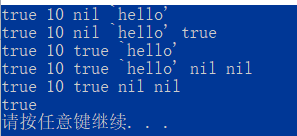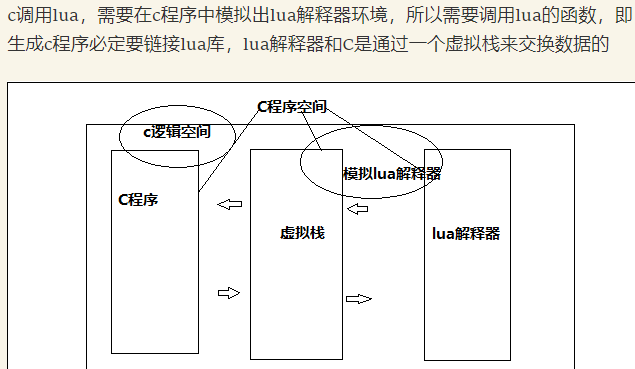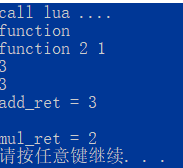The following contents are taken from online public documents
1. Download the source code: http://www.lua.org/ftp/
2.1 compiling dll:
Add Lua in "C/C + +" > "preprocessor" - > "preprocessor definition"_ BUILD_ AS_ DLL: no lib
Do not add (lua.c and luac.c)
2.2 compile exe and add corresponding files
lua.c: Compiler
luac.c: Interpreter
3. Test the generated libraries (x64,x86 and libraries should be consistent)
3.1 stack operation
1 #include<stdio.h> 2 #include<stdlib.h> 3 4 //Note add extern "C",Otherwise, a link error occurs 5 extern "C" { 6 #include "lua.h" 7 #include "lualib.h" 8 #include "lauxlib.h" 9 } 10 11 #ifdef _DEBUG 12 #pragma comment(lib,"./Lua/Debug/Luad.lib") 13 #else 14 #pragma comment(lib,"./Lua/Release/Lua.lib") 15 #endif 16 17 static void stackDump(lua_State* L) 18 { 19 int i = 0; 20 int top = lua_gettop(L); 21 for (i = 1; i <= top; i++) 22 { 23 int t = lua_type(L, i); 24 switch (t) 25 { 26 case LUA_TSTRING: /* strings */ 27 printf("`%s'", lua_tostring(L, i)); 28 break; 29 case LUA_TBOOLEAN: /* booleans */ 30 printf(lua_toboolean(L, i) ? "true" : "false"); 31 break; 32 case LUA_TNUMBER: /* numbers */ 33 printf("%g", lua_tonumber(L, i)); 34 break; 35 default: /* other values */ 36 printf("%s", lua_typename(L, t)); 37 break; 38 } 39 printf(" "); /* put a separator */ 40 } 41 printf("\n"); /* end the listing */ 42 } 43 44 int main(int argc, char** argv) 45 { 46 lua_State* L = luaL_newstate(); // establish Lua virtual machine 47 48 luaL_openlibs(L); // open Lua State machine"L"All in Lua Standard library 49 50 // Push value into virtual stack 51 lua_pushboolean(L, 1); // true 52 lua_pushnumber(L, 10); // 10 53 lua_pushnil(L); // nil 54 lua_pushstring(L, "hello"); // "hello" 55 stackDump(L); // true 10 nil 'hello' 56 57 lua_pushvalue(L, -4); // Index-4 Stack a copy of the value at 58 stackDump(L); // true 10 nil 'hello' true 59 60 lua_replace(L, 3); // Move the top element of the stack to index 3 and overwrite the original element 61 stackDump(L); // true 10 true 'hello' 62 63 lua_settop(L, 6); // Set the top of the stack to index 6, and the extra new elements are assigned as"nil" 64 stackDump(L); // true 10 true 'hello' nil nil 65 66 lua_remove(L, -3); // Remove index-3 The element at which all elements are moved down 67 stackDump(L); // true 10 true nil nil 68 69 lua_settop(L, -5); // Set stack top to index-5 place 70 stackDump(L); // true 71 72 lua_close(L); // close Lua State machine 73 74 system("pause");//stay Linux Next compilation, please note this line 75 76 return 0; 77 }

3.2 C calls Lua

1 static int multi_math(lua_State* L, int x, int y) 2 { 3 int ret = 0; 4 int add_ret = 0; 5 int sub_ret = 0; 6 int mul_ret = 0; 7 8 //call lua_add 9 lua_getglobal(L, "lua_add");//Put function lua_add Push into stack 10 stackDump(L); //function 11 lua_pushnumber(L, x); //function 2 12 lua_pushnumber(L, y); //fucntion 2 1 13 stackDump(L); 14 lua_call(L, 2, 1); //Indicates that there are 2 parameters, 1 return value, and function 2 1 Pop up the stack and push the return value into the stack 15 16 stackDump(L); 17 add_ret = (int)lua_tonumber(L, -1); 18 stackDump(L); 19 printf("add_ret = %d\n", add_ret); 20 lua_pop(L, 1); //Pop stack top 21 stackDump(L); 22 23 #if 0 24 //call local lua_sub will cause running error 25 lua_getglobal(L, "lua_sub"); 26 lua_pushnumber(L, x); 27 lua_pushnumber(L, y); 28 lua_call(L, 2, 1); 29 sub_ret = (int)lua_tonumber(L, -1); 30 printf("sub_ret = %d\n", sub_ret); 31 lua_pop(L, 1); 32 #endif 33 //call lua_mul 34 lua_getglobal(L, "lua_mul"); 35 lua_pushnumber(L, x); 36 lua_pushnumber(L, y); 37 lua_call(L, 2, 1); 38 mul_ret = (int)lua_tonumber(L, -1); 39 printf("mul_ret = %d\n", mul_ret); 40 lua_pop(L, 1); 41 42 return ret; 43 } 44 int main(int argc, char** argv) 45 { 46 lua_State* L = luaL_newstate(); // establish Lua virtual machine 47 luaL_openlibs(L); // open Lua State machine"L"All in Lua Standard library 48 49 printf("call lua ....\n"); 50 if (luaL_dofile(L, "main.lua"))//Load run main.lua 51 { 52 printf("call lua failed!\n"); 53 } 54 if (multi_math(L, 2, 1)) 55 { 56 printf("call multi_math failed!\n"); 57 } 58 59 lua_close(L); // close Lua State machine 60 61 system("pause"); 62 63 return 0; 64 }

3.3 lua call C
Its interface must follow the form required by Lua, that is, typedef int (*lua_CFunction)(lua_State* L)
1 //stay Lua Invoked C Register functions. 2 static int add2(lua_State* L) 3 { 4 //Check whether the parameters in the stack are legal. 1 means Lua The first parameter when calling(From left to right),And so on. 5 //If Lua The parameter passed by the code when calling is not number,This function will report an error and terminate the execution of the program. 6 double op1 = luaL_checknumber(L, 1); 7 double op2 = luaL_checknumber(L, 2); 8 //Push the result of the function onto the stack. If there are multiple return values, you can push them into the stack multiple times here. 9 lua_pushnumber(L, op1 + op2); 10 //The return value is used to prompt the C The number of return values of the function, that is, the number of return values pushed into the stack. 11 return 1; 12 } 13 //Another to be Lua Invoked C Register functions. 14 static int sub2(lua_State* L) 15 { 16 double op1 = luaL_checknumber(L, 1); 17 double op2 = luaL_checknumber(L, 2); 18 lua_pushnumber(L, op1 - op2); 19 return 1; 20 } 21 const char* testfunc = "print(add2(1.0,2.0)) print(sub2(20.1,19))"; 22 23 int main() 24 { 25 lua_State* L = luaL_newstate(); 26 luaL_openlibs(L); 27 //Registers the specified function as Lua Global function variable, where the first string parameter is Lua code 28 //In call C The global function name used in the function. The second parameter is the actual value C Pointer to the function. 29 lua_register(L, "add2", add2); 30 lua_register(L, "sub2", sub2); 31 //After registering all C Function, you can Lua Use these registered in the code block of C Function. 32 if (luaL_dostring(L, testfunc)) 33 printf("Failed to invoke.\n"); 34 lua_close(L); 35 return 0; 36 37 }

3.4 C function library becomes Lua's module (no direct excerpt for the time being).
Copy the code generation library file containing C function, such as so of Linux or DLL of Windows, to the current directory where Lua code is located, or Lua_ The directory pointed to by cpath environment variable so that Lua parser can locate them correctly. In my current Windows system, I copy it to "C: \ program files \ Lua \ 5.1 \ clips \", which contains all C libraries that Lua can call. See the following C language codes and key notes:
#include <stdio.h>
#include <string.h>
#include <lua.hpp>
#include <lauxlib.h>
#include <lualib.h>
//C function to be registered. The declaration form of this function has been given in the above example.
//It should be noted that this function must be exported in the form of C, so extern "C" is necessary.
//The function code is the same as the above example, which will not be repeated here.
extern "C" int add(lua_State* L)
{
double op1 = luaL_checknumber(L,1);
double op2 = luaL_checknumber(L,2);
lua_pushnumber(L,op1 + op2);
return 1;
}
extern "C" int sub(lua_State* L)
{
double op1 = luaL_checknumber(L,1);
double op2 = luaL_checknumber(L,2);
lua_pushnumber(L,op1 - op2);
return 1;
}
//luaL_ The first field of the reg structure is a string, which is used to inform Lua of the name of the function during registration.
//The first field is the C function pointer.
//The two fields of the last element in the structure array are NULL, which is used to prompt Lua that the registration function has reached the end of the array.
static luaL_Reg mylibs[] = {
{"add", add},
{"sub", sub},
{NULL, NULL}
};
//The unique entry function of the C library. Its function signature is equivalent to the above registered function. See the following description:
//1. We can simply understand this function as the factory function of the module.
//2. Its function name must be luaopen_xxx, where xxx represents the library name. Lua code require "xxx" needs to correspond to it.
//3. In lual_ In the call of register, the first string parameter is the module name "xxx", and the second parameter is the array of functions to be registered.
//4. It should be emphasized that all codes that need to use "xxx", whether C or Lua, must be consistent. This is Lua's agreement,
//Otherwise, it cannot be called.
extern "C" __declspec(dllexport)
int luaopen_mytestlib(lua_State* L)
{
const char* libName = "mytestlib";
luaL_register(L,libName,mylibs);
return 1;
}
See Lua code below:
require "mytestlib" -- specify the package name
-- when calling, it must be package function
print(mytestlib.add(1.0,2.0))
print(mytestlib.sub(20.1,19))